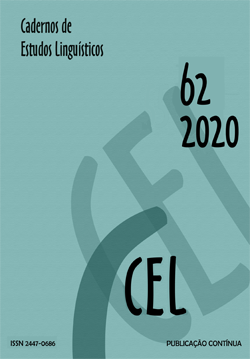Abstract
This paper discusses about the theoretical connections between gender stylization and language ideologies. The concept of gender stylization comes from the gender theory of Judith Butler (2019) about the stylization of the body and the definitions of language ideologies are given by Judith Irvine (1989), Jan Blommaert (2014) e Deborah Cameron (2014). The main objective is to comprehend how language ideologies act on gender stylization to produce and legitimize gender differences. Moreover, the paper intents to show the utility of aligning the studies of those two phenomena for the field of Feminist Linguistics. The discussions are founded on the theorizings about language ideologies and gender stylization, performativity and speech acts (AUSTIN, 1962), and sex/gender distinction (RUBIN, 1975). There is, still, an overview of feminist studies and of Feminist Linguistics before and after the performative turn launched by Butler. The paper shows, in its theoretical observations, that language ideologies participate actively on the highly rigid regulatory structure which builds gender stylization. In order to display the agency of the two phenomena on the current western context, the paper concerns itself with some aspects of new biologism (CAMERON, 2009; 2010; 2014), a language ideology with scientificity content.
References
AUSTIN, J. L. How to do things with words. Oxford: Oxford University Press, 1962.
BARON-COHEN, S. The essential difference: man, women, and the extreme male brain. Londres: Allen Lane, 2003.
BLOMMAERT, J. Ideologias linguísticas e poder. In: SILVA, D.; FERREIRA, D.; ALENCAR, C. (Orgs.) Nova pragmática: modos de fazer. São Paulo: Cortez, 2014, p. 67-76.
BORBA, R. A linguagem importa? Sobre performances, performatividade e peregrinações conceituais. cadernos pagu, Campinas, n. 43, p. 441-474, 2014. DOI http://dx.doi.org/10.1590/0104-8333201400430441.
BORBA, R.; LOPES, A. Escrituras de gênero e políticas de différance: imundície verbal e letramentos de intervenção no cotidiano escolar. Linguagem & Ensino, Pelotas, v. 21, n. esp., p. 241-285, 2018.
BUTLER, J. Problemas de gênero. 19. ed. Rio de Janeiro: Civilização Brasileira, 2019.
CAMERON, D. Desempenhando identidade de gênero: conversa entre rapazes e a construção da masculinidade heterossexual. In: OSTERMANN, A. C.; FONTANA, B. (Orgs.). Linguagem, gênero, sexualidade: clássicos traduzidos. São Paulo: Parábola, 2010. p. 129-149.
CAMERON, D. Gender, language, and the new biologism. Constellations, v. 17, n. 4, p. 527-539, 2010. DOI: https://doi.org/10.1111/j.1467-8675.2010.00612.x.
CAMERON, D. Gender and language ideologies. In: EHRLICH, S.; MEYERHOFF, M.; HOLMES, J. (Eds.). The handbook of language, gender and sexuality. Malden: Wiley Blackwell, 2014, p. 281-296.
CAMERON, D. Sex/gender, language and the new biologism. Applied Linguistics, v. 31, n. 2, p. 173-192, 2009. DOI: https://doi.org/10.1093/applin/amp022.
CAMERON, D. The feminist critique of language: a reader. 2. ed. Abingdon: Routledge, 2005.
CAMERON, D. Theorising the female voice in public contexts. In: BAXTER, J. Speaking out: the female voice in public contexts. Hampshire: Palgrave Macmillan, 2006, p. 3-20.
CAMERON, D. Verbal hygiene. 2. ed. Londres: Routledge, 2012.
CARR, J.; PAUWELS, A. Boys and foreign language learning: real boys don’t do languages. Hampshire: Palgrave Macmillan, 2006.
FAUSTO-STERLING, A. Dualismos em duelo. cadernos pagu, Campinas, n. 17-18, p. 9-79, 2002. DOI: http://dx.doi.org/10.1590/S0104-83332002000100002.
FINE, C. Delusions of gender: the real science behind sex differences. 2. ed. Londres: Icon Books, 2010.
HALL, K.; BUCHOLTZ, M. Gender articulated: language and the socially constructed self. Nova York: Routledge, 1995.
IRVINE, J. When talk isn’t cheap: language and political economy. American Ethnologist, v. 16, n. 2, p. 248-267, 1989. DOI https://doi.org/10.1525/ae.1989.16.2.02a00040.
JESPERSEN, O. The woman. In: CAMERON, D. (Ed.). The feminist critique of language: a reader. 2. ed. Abingdon: Routledge, 2005, p. 225-241.
KULICK, D. Speaking as a woman: structure and gender in domestic arguments in a New Guinea village. Cultural Anthropology, v. 8, n. 4, p. 510–541, 1993.
LAKOFF, R. Language and Women’s Place. Nova York: Harper and Now, 1975.
LAKOFF, R. Language and Women’s Place. 2. ed. Nova York: Oxford University Press, 2004.
LIVIA, A.; HALL, K. “É uma menina!”: a volta de performatividade à linguística. In: OSTERMANN, A. C.; FONTANA, B. (Orgs.). Linguagem, gênero, sexualidade: clássicos traduzidos. São Paulo: Parábola, 2010. p. 109-127.
MCELHINNY, B. Theorizing gender in sociolinguistics and linguistic anthropology. In: HOLMES, J.; MEYERHOFF, M. (Eds.). The handbook of language and gender. Malden: Blackwell, 2003, p. 21-42.
OSTERMANN, A. C. Análise da Conversa (Aplicada) como uma abordagem para o estudo de linguagem e gênero: o caso dos atendimentos a mulheres em situação de violência no Brasil. Athenea Digital, n. 14, p. 245-266, 2008.
OSTERMANN, A. C.; FONTANA, B. Linguagem. Gênero, Sexualidade: uma introdução. In: OSTERMANN, A. C.; FONTANA, B. (Orgs.). Linguagem, gênero, sexualidade: clássicos traduzidos. São Paulo: Parábola, 2010. p. 9-12.
PINTO, J. Conexões teóricas entre performatividade, corpo e identidades. D.E.L.T.A, São Paulo, v. 23, n. 1, p. 1-26, 2007. DOI http://dx.doi.org/10.1590/S0102-44502007000100001.
PINTO, J. Estilizações de gênero em discursos sobre linguagem. 2002. 219f. Tese (Doutorado em Linguística) – Instituto de Estudos da Linguagem, Unicamp, Campinas, 2002.
PINTO, J. Linguagem, feminismo e efeitos de corpo. In: SILVA, D.; FERREIRA, D.; ALENCAR, C. (Orgs.) Nova pragmática: modos de fazer. São Paulo: Cortez, 2014, p. 207-230.
PISCITELLI, A. Re-criando a categoria mulher? In: ALGRANTI, L. (Org.). A prática feminista e o conceito de gênero. Campinas: IFCH/Unicamp, 2002, p. 1-25.
RAJAGOPALAN, K. Nova pragmática: fases e feições de um fazer. São Paulo: Parábola, 2010.
RUBIN, G. The traffic in women: notes on the political economy of sex. In: REITER, R. (Org.). Toward an anthropology of women. Nova York: Monthly Review, 1975, p. 157-210.
SCOTT, J. Gênero: uma categoria útil de análise histórica. Tradução por Guacira Louro. Educação & realidade, Porto Alegre, v. 20, n. 2, p. 71-99, 1995.
TANNEN, D. You just don’t understand: women and men in conversation. Nova York: William Morrow, 1990.
VALLADA, A.; PINTO, J. Cinco décadas de linguística feminista: índices de consolidação do campo, no prelo.
ZIMMERMAN, D.; WEST, C. Sex roles, interruptions, and silences in conversations. In: THORNE, B.; HENLEY, N. (Eds.). Language and sex: difference and dominance. Rowley: Newbury House, 1975, p. 105-129.

This work is licensed under a Creative Commons Attribution-NonCommercial 4.0 International License.
Copyright (c) 2020 Cadernos de Estudos Linguísticos


